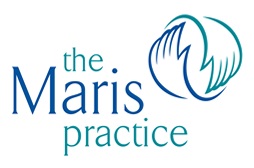The Maris Practice offers 3 speciality areas of counselling and therapy to help you:
- Clinical Psychology – aim is to reduce emotional distress and to enhance and promote psychological wellbeing. Therapeutic approaches include Cognitive-Behavioural Therapy and Compassion-Focused Therapy,
- Counselling – this is a talking therapy which provides support and the opportunity to learn about yourself and your habitual responses so that you can make choices that will improve your well-being.
- Hypnotherapy – this can help you change behaviour and to achieve the best version of ‘you’ that there is. It is perhaps best known for helping people to stop smoking but there are many habitual feelings and behaviour that can modified.
There is more information below about these three therapies.
Clinical Psychology
Clinical Psychologists are trained to work with individuals and families across the lifespan and support people experiencing a wide range of emotional and behavioural difficulties. These may include anxiety, low mood, trauma, stress, bereavement, relationship challenges, and other psychological concerns.
Becoming a Clinical Psychologist requires extensive training, typically taking between 6 to 10 years. This includes completing an undergraduate and/or master’s degree in psychology, gaining postgraduate clinical experience (tepidly 2-5 years) and undertaking a Doctorate in Clinical Psychology, which involves both academic study and supervised clinical practice.
Clinical Psychologists in the UK are primarily trained within the NHS and must meet rigorous professional standards. After qualifying, they are required to engage in ongoing training to ensure their knowledge and skills remain up to date. All Clinical Psychologists in the UK are registered with the Health and Care Professions Council (HCPC).
Counselling
In today’s world it is hard to find a space to process life’s challenges. Counselling offers a client the permission to talk about themselves, their lives and their relationships without fear of judgement. It provides support and the opportunity to learn about yourself and your habitual responses so that you can make choices that will improve your well-being.
A counselling session will involve a client being supported by a trained and experienced professional to talk about, and process anything that they might be struggling with. All that is shared is confidential, meaning that clients can feel free to discuss anything and everything safe in the knowledge that that it will not be spoken about outside of the therapeutic relationship.
Issues that are often supported by counselling include depression, anxiety, imposter syndrome, relationship issues, bereavement, difficulties around social anxiety, issues of identity, gender, sexuality and self-esteem difficulties.
At the Maris Practice our counsellor Annabelle, is particularly experienced with supporting parents, both new parents and parents struggling as their children navigate their way through school and into the world.
Hypnotherapy
Hypnotherapy can help you change behaviour if you want it to! Hypnotherapy is a way of harnessing your brain’s natural power to enable you to achieve change and to achieve the best version of ‘you’ that there is! It is a method that has been clinically proven to be effective, offering you the best chance of success.
Hypnosis is a simple, down-to-earth and common-sense therapy that can enable you to progressively improve your habitual feelings and behaviour. It is effective for older children and teenagers as well as adults.
The evidence shows that it is particularly effective in helping people with:
- Stress and anxiety,
- Pain,
- Menopausal symptoms,
- Phobias,
- Irritable bowel syndrome,
- Weight issues,
- Insomnia.
